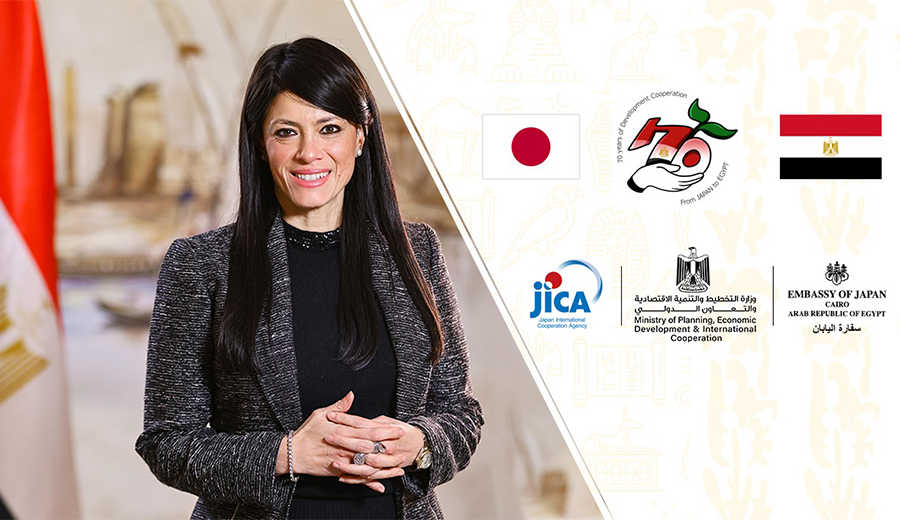Minister of Planning, Economic Development, and International Cooperation Participates in the Celebration of the 70th Anniversary of Development Cooperation Relations Between Egypt and Japan

23 February 2025
Organized by the Japanese Embassy and the Japan
International Cooperation Agency (JICA)
Minister of Planning, Economic Development, and
International Cooperation Participates in the Celebration of the 70th
Anniversary of Development Cooperation Relations Between Egypt and Japan
"Al-Mashat": We are working to expand the Egyptian-Japanese partnership and increase financing mechanisms to empower the private sector.
Human development and capacity building are key parts of development cooperation with Japan.
Leveraging Japanese expertise in technology and artificial intelligence.
H.E. Dr. Rania A. Al-Mashat, Minister of Planning, Economic
Development, and International Cooperation, participated in the celebration
organized by the Japanese Embassy in Egypt and the Japan International
Cooperation Agency (JICA) to mark the 70th anniversary of development
cooperation between Egypt and Japan. The event was held at the Egyptian Opera
House in the presence of H.E. Mrs. Faiza Abou El-Naga, National Security
Advisor to the President of the Arab Republic of Egypt, Mr. Iwai Fumio,
Ambassador of Japan to Egypt, and Mr. Kato Ken, Chief Representative of JICA's
office in Egypt.
During her speech, H.E. Dr. Rania A. Al-Mashat emphasized
that the development cooperation between Egypt and Japan is founded on mutual
respect, a shared vision for sustainable development, and a steadfast
commitment to enhancing economic and social prosperity. She highlighted the
significant momentum and progress in bilateral relations, strengthened through high-level
visits, which have elevated the partnership to a strategic level.
H.E. Al-Mashat noted that the Ministry of Planning, Economic
Development, and International Cooperation has been actively working to expand
this partnership. She referenced her visit to Japan last December, where three
memorandums of understanding were signed: one for financing development
policies focused on economic inclusion and green growth worth $230 million,
another for a grant to the Egyptian Opera House valued at $1.2 million, and a
third grant for economic and social development in the agriculture sector,
totaling $3.2 million. These agreements reflect the deepening partnership,
aligning Japanese development funding mechanisms with Egypt's national
priorities as outlined in Egypt Vision 2030 and the government’s action program
(2024-2027).
"Japan has continuously supported development in Egypt
through cooperation programs, providing approximately $2.4 billion in technical
support grants and $7.2 billion in development finance," H.E. Al-Mashat
stated. She explained that this support has been instrumental in the success of
key projects, such as the the Grand Egyptian Museum (GEM), the Egypt-Japan
University of Science and Technology (E-JUST), the Universal Health Insurance
Project, the extension of the Cairo University Specialized Pediatric Hospital
(Abu-El Reesh), and Phase I of the Cairo Metro Line 4.
She also stressed the importance of developing human
capital, which remains a priority area in the Egypt-Japan partnership. This
includes enhancing capacity building, education, and vocational training to
equip individuals with the skills necessary to thrive in an evolving global
landscape. The Egypt-Japan Education Partnership Program (EJEP) is central to
modernizing Egypt’s education system, integrating "Tokkatsu"
activities and Japan-inspired methodologies across 51 operational
Egyptian-Japanese Schools (EJS). The network has expanded to include 1,700
schools across Egypt's governorates, with the activation of the Japanese technical
education model (EJ-KOSEN) in select technical institutes.
H.E. Al-Mashat also highlighted the importance of empowering
the private sector by increasing financing mechanisms for companies, investing
in localizing industries, developing human capital, and supporting digital
entrepreneurship and scientific research. Japanese institutions are actively
financing private sector projects, particularly in the energy sector under the
"NWFE" program, such as the 500 MW solar power plant in Kom Ombo,
Aswan, and the onshore wind farm project in Ras Ghareb.
In conclusion, the Minister expressed her satisfaction with the recent collaboration between JICA and various Egyptian ministries in leveraging Japan's expertise in artificial intelligence. This partnership will contribute to Egypt's AI agenda by integrating AI across economic sectors, developing skills, and strengthening infrastructure. She also announced plans to unveil the "Egypt-Japan Cooperation Strategy" and publish a report on the development cooperation portfolio in the near future.









